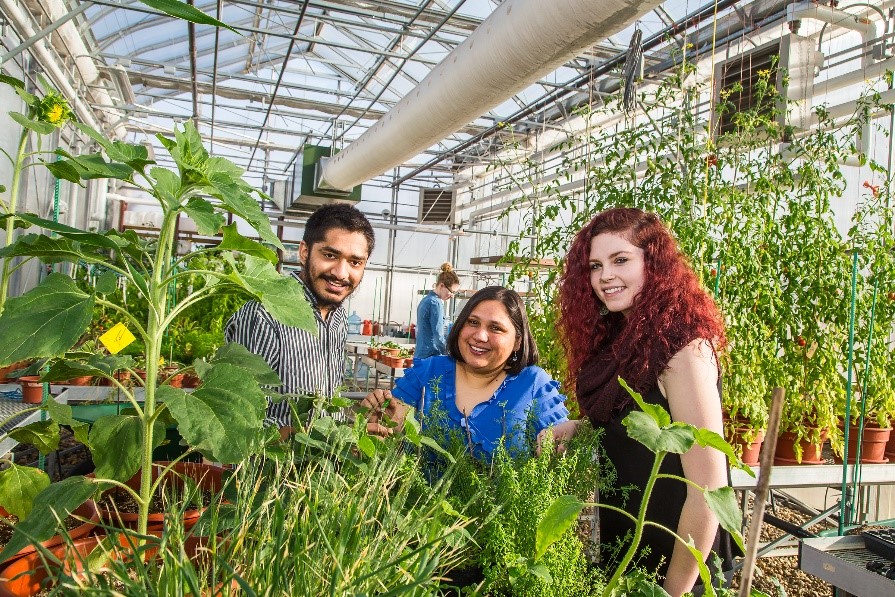Assiniboine Community College
Assiniboine Community College’s (ACC) Field to Fork research cluster through the School of Agriculture and Environment is an applied research and teaching initiative uniting food-systems expertise for the benefit of faculty, students, industry and community. Programs such as Food Processing for Animal Proteins, Horticultural Production and Sustainable Food Systems complement applied research efforts and respond to the demands and requirements of Manitoba's labour market. The college’s research program focuses on climate change mitigation, food security, sustainable food production and agricultural technology to “feed the future”.

ACC has launched a fundraising campaign to build the Prairie Innovation Centre, an integrated learning environment with a mixture of collaborative learning spaces, applied research labs, multipurpose spaces and amenities. The college has partnered with Protein Industry Canada and Roquette Canada Ltd. to develop two new programs in food science and chemical engineering technology.
Current Collaborations and Research
Sustainable Food Systems - The Field to Fork approach highlights innovation in how food is produced and how harvests are managed, all in the context of food security. Industry-standard and new, modern approaches to growing fruits and vegetables, either inside the greenhouse or in the field, are explored.
Horticultural Production - This program offers participation in pioneering research projects and finding ways to improve greenhouse management and food production. The Integrated Pest Management (IPM) course examines the most modern biological controls in food growth with an aim to reduce chemical interventions for controlling pests.
Food Processing - Animal Proteins - Delivered in a newly built, modern teaching lab, students learn all aspects of the trade, including nutrition, safety, tools, workplace values and essential communication skills. Students develop skills in curing and smoking for all types of animal protein, including poultry, beef, pork, goat and lamb. Students are connected with local employers through a 12-week work practicum and can take advantage of employment opportunities while enrolled full-time in the program.
Additional ongoing collaborative research includes:
- soybean production guidelines and fungicide use in dry beans
- molecular diagnostic tools for onion neck rot disease
- custom-integrated pest management program using biological control agents
- supplemental oxygen impact on yield and shelf life in hydroponically grown vegetables
- advanced growing methodology for producing sweet potato slips
- low-tech passive solar greenhouse technology

Academic and Research Programs
- Dr. Sajjad Rao, P.Ag.: Plant Nutritional Qualities, Plant Proteins, Fruit Quality and Plant Health, Foliar Nutrients and Soil Biological Stimulators, Sustainable Greenhouse Technology, New Crop Genetics, Local Crop Production and Diversification
- Dr. Poonam Singh, B.Ed., PIDP., P.Ag: Sustainable Horticultural Crop Production, Hydroponic Crop Cultivation, Soilless Substrates for Horticultural Cropping Systems, Traditional Food Systems, Microbial Product Evaluation
- Dr. Baljeet Singh, P.Ag.: Crop Pest Diagnostic and Management, Soil Fertility, Soil Health, Pesticide Degradation and Efficacy, Agronomic Research Trials and Disease and Insect Pest Survey
- Mr. Grant Nicol, CET, INTET (CANADA): Communication Engineering Technology, Smart Agriculture Tools for Crop and Livestock Production
- Mr. James Hood, B.Sc. M.N.R.M.: Watershed Planning, Source Water Protection, Manure Management, Riparian Area Health, Environmental Management
Centres and Colleges
Assiniboine Community College's Field to Fork programs are located on the North Hill Campus in Brandon and its technical research infrastructure includes a 3,300-square-foot sustainable greenhouse complex with different solar-powered, energy-efficient grow sections. ACC has an established 2.5 acre grow plot, a 315-square-metre traditional Indigenous medicines and culinary plants garden, a teaching orchard and the Manitoba Weed Identification Centre. Laboratory facilities include ACC’s recently renovated Grow Laboratory with an environmentally controlled growth chamber and a Soils Laboratory for testing of texture, structure, pH, electronic conductivity, organic carbon and other soil aspects. ACC's Food Processing for Animal Proteins Program is delivered on the Victoria Avenue East Campus.
Contact
For more information about ACC, visit their website. Email us at mbproteinadvantage@gov.mb.ca to get this information in an alternate formate.

